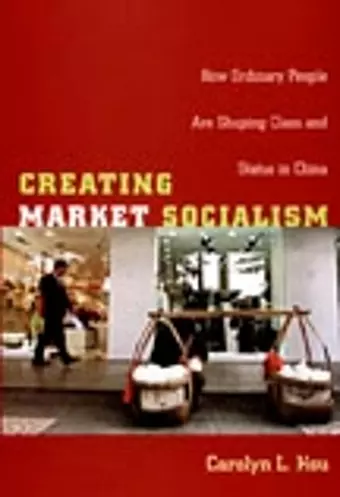Creating Market Socialism
How Ordinary People Are Shaping Class and Status in China
Format:Hardback
Publisher:Duke University Press
Published:3rd Sep '07
Currently unavailable, and unfortunately no date known when it will be back

Examines how people, as opposed to Communist Party elites, are establishing the new economic order in China.
Demonstrates the central role of ordinary people - rather than state or market elites - in creating institutions for determining status in China. This book explores the emerging hierarchy, which is based on the concept of suzhi, or quality.In the midst of China’s post-Mao market reforms, the old status hierarchy is collapsing. Who will determine what will take its place? In Creating Market Socialism, the sociologist Carolyn L. Hsu demonstrates the central role of ordinary people—rather than state or market elites—in creating new institutions for determining status in China. Hsu explores the emerging hierarchy, which is based on the concept of suzhi, or quality. In suzhi ideology, human capital and educational credentials are the most important measures of status and class position. Hsu reveals how, through their words and actions, ordinary citizens decide what jobs or roles within society mark individuals with suzhi, designating them “quality people.”
Hsu’s ethnographic research, conducted in the city of Harbin in northwestern China, included participant observation at twenty workplaces and interviews with working adults from a range of professions. By analyzing the shared stories about status and class, jobs and careers, and aspirations and hopes that circulate among Harbiners from all walks of life, Hsu reveals the logic underlying the emerging stratification system. In the post-socialist era, Harbiners must confront a fast-changing and bewildering institutional landscape. Their collective narratives serve to create meaning and order in the midst of this confusion. Harbiners collectively agree that “intellectuals” (scientists, educators, and professionals) are the most respected within the new social order, because they contribute the most to Chinese society, whether that contribution is understood in terms of traditional morality, socialist service, or technological and economic progress. Harbiners understand human capital as an accurate measure of a person’s status. Their collective narratives about suzhi shape their career choices, judgments, and child-rearing practices, and therefore the new practices and institutions developing in post-socialist China.
“Carolyn L. Hsu examines the narrative construction of systems of value and stratification in the transition away from socialist economic structures. This emphasis allows her to move beyond studies of stratification that are overly focused on state institutions. She demonstrates how people from all walks of life reinterpret the narratives issued from various organs of the Chinese state and how these reinterpretations affect the job choices and life strategies of individuals as well as the corporate and collective strategies of the institutions for which they work. In so doing, she makes an important contribution not only to the study of post-Mao China but also to the sociology of post-socialist societies more generally.”—Andrew Kipnis, author of China and Postsocialist Anthropology: Theorizing Power and Society after Communism
“[A] valuable contribution to the study of post-socialist societies, post-Mao China more specifically.” * Critical Sociology *
“Hsu’s extensive ethnographic research and secondary-literature analysis make this text a pleasant pathway to understanding China’s current social-stratification system. The flowing writing style strengthens her arguments and expands her effectiveness in unraveling the process in which ordinary people shape class and status in China’s marketplace. The text is, therefore, easily accessible to readers of different backgrounds with interest in Chinese political structure, culture, and market reform.” -- Linda Q. Wang * International Social Science Review *
“The qualitative data in this study are rich, and the text itself is accessible and well-written; Hsu goes to considerable lengths to avoid complex academic jargon, and she presents her points in a straightforward manner. She also makes great efforts to draw out the historical linkages in the narratives she analyzes, pointing to narrative threads drawn from pre-Communist, Maoist, and reform-era discourses.” -- Amy Hanser * Canadian Journal of Sociology *
ISBN: 9780822340171
Dimensions: unknown
Weight: 454g
240 pages